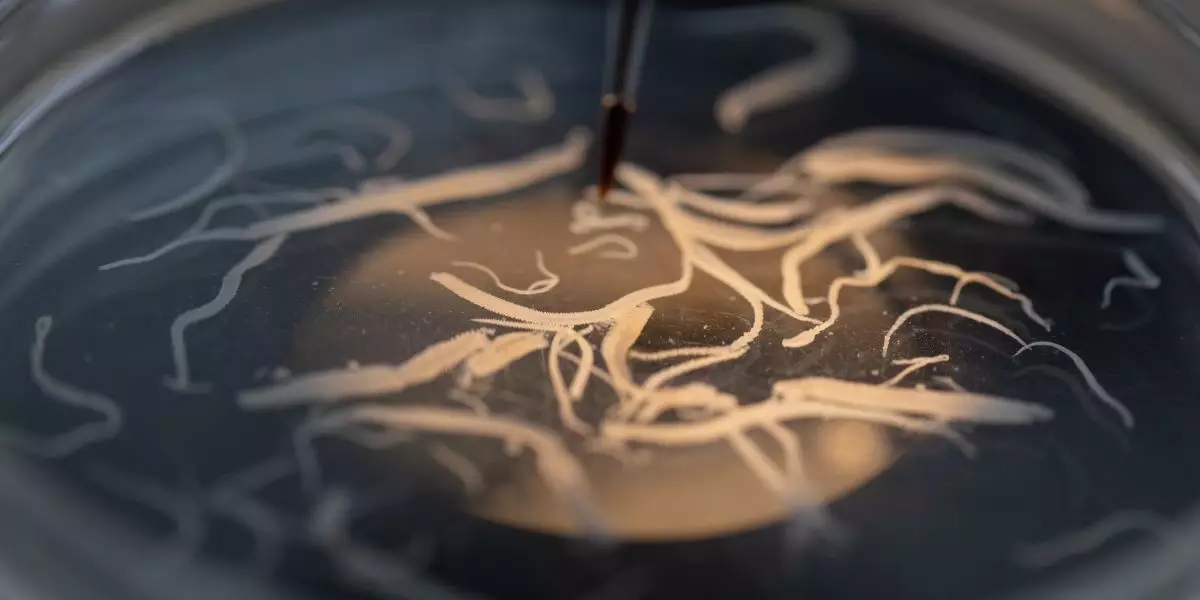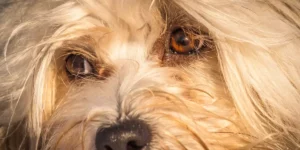Who doesn't like to see her dog's tail fret with joy or the soothing rumbling of her beloved cat? Our four-legged companions are real treasures, always ready to warm our hearts with their hugs and faces. But behind these moments of complicity is sometimes a less pleasant reality: round worms.
The round worms are these little intruders who sneak quietly into the digestive system Our dogs and cats, and they cause them a lot of trouble. Loss of appetite, weight loss or digestive problems, these parasites affect the health and well-being of their hosts.
Although they may worry you, Round worms can be processed easily and quickly.
In this article, you will learn to recognize the signs of infestation, to understand the harms of these internal parasites, to naturally combat them and to prevent future infections.
Understand the round worms
What are the round worms?
The round worms... These little intruders who can sneak into the intestines of our four-legged companions without shouting out. But what are they really?
Also known as nematodes, round worms are intestinal parasites in dogs and cats. These tiny creatures are unwelcome intruders who invite themselves into the digestive system of our precious companions. They establish their residence in order to enjoy the temperature of the intestines that is pleasant to them and to feed on the nutrients they contain.
These parasites have a good way to breed and thrive. They can lay eggs that are found in the environment, patiently waiting to be ingested by your companion. Once in the intestine, these eggs hatch to release larvae that can move in the body of the animal, sometimes even reaching other organs, depriving the animal of the nutrients necessary for its growth and proper functioning.
As the round worms feed and grow, they can reach a considerable size, sometimes several centimetres long. Their presence in the intestines will then become more and more disturbing for their hosts, causing a irritation of the intestinal wall and causing local inflammatory reactions.
Finally, some eggs that the round worms produce will be excreted in the stools of the infested animal, which increases the risk of spread other animals or even humans.
Most common roundworm species in dogs and cats
There are different species of round worms, but the most common in dogs and cats are the Toxocara canis and Toxocara cati. They're the ones who're gonna mess up and make our hairy friends uncomfortable.
The Toxocara canis
Also known as « dog round worms« , the Toxocara canis are parasites that prefer dog company but are not primarily intended for them. They can cause trouble for toddlers even before they are born. Indeed, puppies can be infected by larvae transmitted by their mother via the placenta. Finally, these worms will tend to hide in contaminated soils, patiently waiting for a curious dog to ingest them.
The Toxocara cati
The Toxocara cati or « round cat worms« , as for them, are specifically attracted to felines and often sneak into the life of our adorable kittens. Kittens encounter them when feeding on larval contaminated breast milk. But be careful, even our adult cats are victims of these invaders by ingesting infected eggs or prey.
The life cycle of round worms: a sneaky journey
The life cycle of the round worms is a truly tortuous and fascinating journey. It all starts with eggs scattered in the environment. They are found in contaminated soils or even feces of infested animals. These eggs patiently wait for a potential host to pass through.
When your dog or cat ingests these eggs, this is the beginning of an adventure for these parasites. Eggs hatch in the intestine, releasing small larvae eager for exploration. These larvae then undertake a journey through the animal's body. They can migrate to other organs, such as the lungs or liver, creating a real mess inside our companion.
But that's not all. Over time, these larvae grow and grow in adult worms in the intestine of the animal. This is where they find their permanent residence. Adult worms breed and lay new eggs, which will then come out of the animal body by stools, ready to start their cycle again in the environment.
Transmission of round worms: how are animals infected?
The transmission of these unwanted visitors can be done in different ways, and it is important to understand these modes of transmission to better protect our pets.
One common route of transmission is ingestion of round worm eggs in the environment.. These eggs may be found in contaminated soils, gardens or even fecals of infested animals. When our companions explore the world with their curious snout, they can ingest these eggs without knowing it, thus starting the cycle of infestation.
Transmission can also occur through direct contact with animals already infected with round worms. When our four-legged friends meet, they can exchange more than just friendly sniffing. Round worms can be transmitted from one animal to another by direct contact with contaminated stools or feces. This is why it is essential to keep our dogs and cats away from areas where other infested animals may have left their dejections.
Round worms can also be transmitted from the mother to her little ones. Puppies and kittens can be infected with round worms already present in their mother's body. Transmission may occur during pregnancy or breastfeeding, which underlines the importance of taking preventive measures to protect litters from an early age.
Recognize the symptoms of a roundworm infestation
Round worms in stools: sign of infestation
When it comes to detecting a round worm infestation in our beloved dogs and cats, there are signs that show us how to put the chip in our ears. One of the most obvious indicators is the presence of round worms in the stools of our companions.
If you notice small white worms resembling spaghetti in your animal's stools, so there's a good chance that your dog or cat is infested with round worms. Their presence in the stools is often quite blatant, you will not have any trouble clearing them if you pay attention to them.
However, it is important to note that not all worms are always visible to the naked eye. Some round worms may be too small or at a stage of development where they are not yet visible in the stools. Therefore, it is essential to remain attentive to other signs of infestation.
Other common symptoms in dogs and cats infected with round worms
In case your pet's stools do not have round worms, but you still suspect an infestation of your dog or cat, these dots will need your attention, as they may be a sign of the presence of internal parasite:
- Changes in stools : Animals infested with round worms may have abnormal stools, such as diarrhea or constipation. The stools appear abnormal, with an unusual texture or traces of mucus.
- Weight loss : Round worms, feeding on your animal's nutrients, will often lead to weight loss in infested animals.
- Vomiting : Some animals with round worms tend to experience episodes of vomiting, sometimes accompanied by worms in vomiting.
- Swelling of abdomen : In serious cases of round worm infestation, the accumulation of worms in the intestine results in swelling of the animal's abdomen.
- Anal itching : In some animals, infestation with round worms causes intense itching around the anus. The animal rubs or drags its rear-train on the ground to relieve itching.
Risks associated with untreated round worms
Roundworm infestation in our dogs and cats may seem to be a minor problem, but it causes many health problems if it is untreated.
One of the main dangers is the impact on the digestive system animal. Round worms feed on the essential nutrients present in your animal's intestine, which will lead to a nutritional deficiency and one deterioration in general health. The dog or cat will often undergo a weight loss and will have daily weaknesses due to a energy reduction. These weaknesses may be projected in some cases on theGeneral appearance animal.
Moreover, round worms may cause irritation and inflammation of the intestine, which leads to digestive problems, vomiting, diarrhoea or constipations and abnormal stools.
Your animal's immune system will be weakened due to lack of energy. Indeed, parasites consume the nutrients necessary for the proper functioning of the immune system, making your companion more vulnerable to infections and diseases. A weakened immune system will cause increased frequency and severity of diseases, making your animal more susceptible to other infections.
Finally, in serious cases of roundworm infestation, these parasites will spread to other vital organs such as the lungs, liver and heart, causing respiratory symptoms, liver problems and heartor even permanent damage to organs.
It is therefore essential to take seriously the infestation of round worms and to act quickly to treat and eliminate these parasites. By choosing natural deworming and effective, you can protect the overall health of your animal and prevent the risks associated with this condition.
Do not let round worms compromise the well-being of your companion. Explore appropriate treatment options and take the necessary steps to eradicate these unwanted parasites. Together, we can ensure a healthy and fulfilling life for our beloved four-legged friends.
Grandma's Remedy: Natural Vermifuge against dog and cat round worms
Discover our natural product specially designed for worms in dogs and cats. Are you tired of aggressive chemicals and unwanted side effects? Our natural solution offers a safe and efficient alternative. Thanks to its unique formula based on natural ingredients, it acts smoothly while effectively targeting Internal parasites. Protect the health of your pets in a natural way, without compromising on efficiency.





